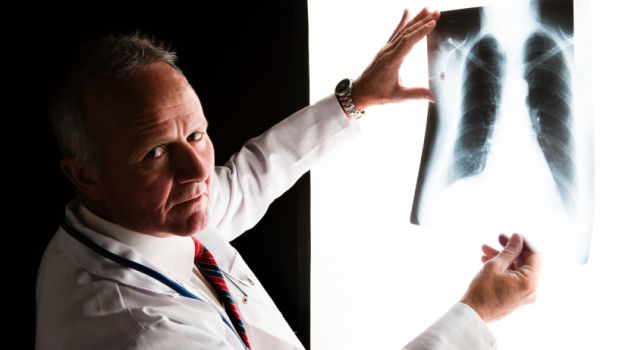In the year 2018, approximately 1.8 million deaths across the globe were attributable to lung cancer. In India alone, about 60,000 patients died due to lung cancer in that year.

Early detection can help people with lung cancer live longer
Lung cancer is one of the leading causes of cancer-related death in the world and will likely remain so in the foreseeable future. This is not fearmongering, but merely a reflection of the current grim reality.
Lung cancer happens when certain cells in our lungs undergo uncontrolled multiplication. This can become widespread and invade other organs like liver and brain. In the year 2018, approximately 1.8 million deaths across the globe were attributable to lung cancer. In India alone, about 60,000 patients died due to lung cancer in that year.
Cigarette smoking in India remains the biggest cause of lung cancer. According to Dr. Anita Ramesh, Professor HOD & Senior Consultant ,Saveetha Hospital & Medical College and Consultant Medical Oncologist at Apollo Hospital & Kauvery Hospital, Chennai, "The smoke from a lighted cigarette contains more than 3,000 chemicals, most of which have been implicated as cancer-causing agents. In fact, if a person smokes more than one pack of cigarettes every day, he/she has a 20 times greater risk of developing lung cancer than a non-smoker".
"The smoke from a lighted cigarette contains more than 3,000 chemicals, most of which have been implicated as cancer-causing agents. In fact, if a person smokes more than one pack of cigarettes every day, he/she has a 20 times greater risk of developing lung cancer than a non-smoker".

Dr Anita Ramesh
HOD and Senior Consultant, Saveetha Hospital And Medical CollegeImportantly, the type of lung cancer found among smokers differs from those who are not smokers. 'Small cell lung cancers' almost always occur in smokers, while 'non-small cell lung cancers' occurs among smokers and non-smokers in almost equal numbers.
Lung cancer is broadly classified into two types i.e. non-small cell lung cancer (NSCLC) and small cell lung cancer. NSCLC is the most common form of lung cancer and accounts for about 80-85% of all lung cancers. NSCLC grows and spreads slowly. Thus, managing and treating this form of lung cancer is relatively easy. It is further sub-categorized into: Adenocarcinoma, Squamous cell carcinoma and Large cell carcinoma
"An important growing concern is the rise of lung cancer in young people and non-smokers", Dr. Anand Pathak, Medical Director at National Cancer Institute (Nagpur), worryingly opines. "This is linked to the alarming increase in air pollution, especially in urban areas. The association between air pollution and lung cancer has been well established for decades. In fact, The International Agency for Research on Cancer (IARC), classified outdoor air pollution as carcinogenic to humans in 2013".
"The association between air pollution and lung cancer has been well established for decades. In fact, The International Agency for Research on Cancer (IARC), classified outdoor air pollution as carcinogenic to humans in 2013".

Dr Anand Pathak
Medical Director at National Cancer Institute NagpurBeing aggressive in nature, patients with small cell lung cancer have a 5-year survival of less than 8%. The overall 5-year survival for NSCLC is around 25%. While this data is useful, Dr. Manish Singhal, Senior Consultant - Medical Oncology at Apollo Hospitals (Sarita Vihar, New Delhi), advises that there are many other factors that will impact the survival of a lung cancer patient. "For example, younger age at diagnosis helps in better chances of having a longer life. Patients with other medical conditions like hypertension, diabetes and lung diseases have a lower survival rate". "Patients who do not quit smoking even after diagnosing of lung cancer are only harming their chances of enjoying a fruitful and long life" Dr. Manish Singhal concludes.
"Patients who do not quit smoking even after diagnosing of lung cancer are only harming their chances of enjoying a fruitful and long life".

Dr. Manish Singhal
Senior Consultant - Medical Oncology at Apollo Hospitals, Sarita Vihar, New DelhiBeing diagnosed with lung cancer can cause fear and stress because the prognosis for a recovery is lower than that of other common types of cancer. According to doctors, in recent years, majority of the people with lung cancer are living longer because of earlier diagnosis by new testing methods and enjoying comparatively better lives because of newer treatments.
Lung cancer can seem like a fearful diagnosis, however, increasing research, faster diagnosis and newer treatment options are a symbol of hope. The need to create awareness about the disease is paramount. Take breaths, not smokes.
Disclaimer: The opinions expressed within this article are the personal opinions of the author. NDTV is not responsible for the accuracy, completeness, suitability, or validity of any information on this article. All information is provided on an as-is basis. The information, facts or opinions appearing in the article do not reflect the views of NDTV and NDTV does not assume any responsibility or liability for the same.
DoctorNDTV is the one stop site for all your health needs providing the most credible health information, health news and tips with expert advice on healthy living, diet plans, informative videos etc. You can get the most relevant and accurate info you need about health problems like diabetes, cancer, pregnancy, HIV and AIDS, weight loss and many other lifestyle diseases. We have a panel of over 350 experts who help us develop content by giving their valuable inputs and bringing to us the latest in the world of healthcare.














